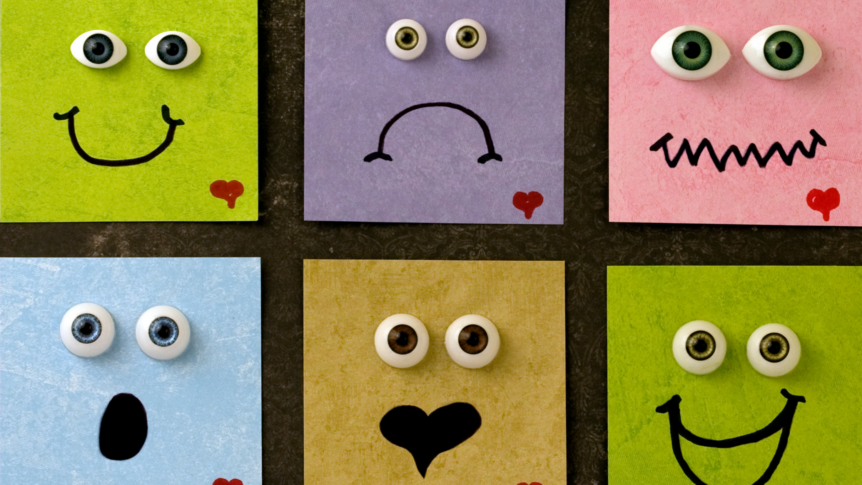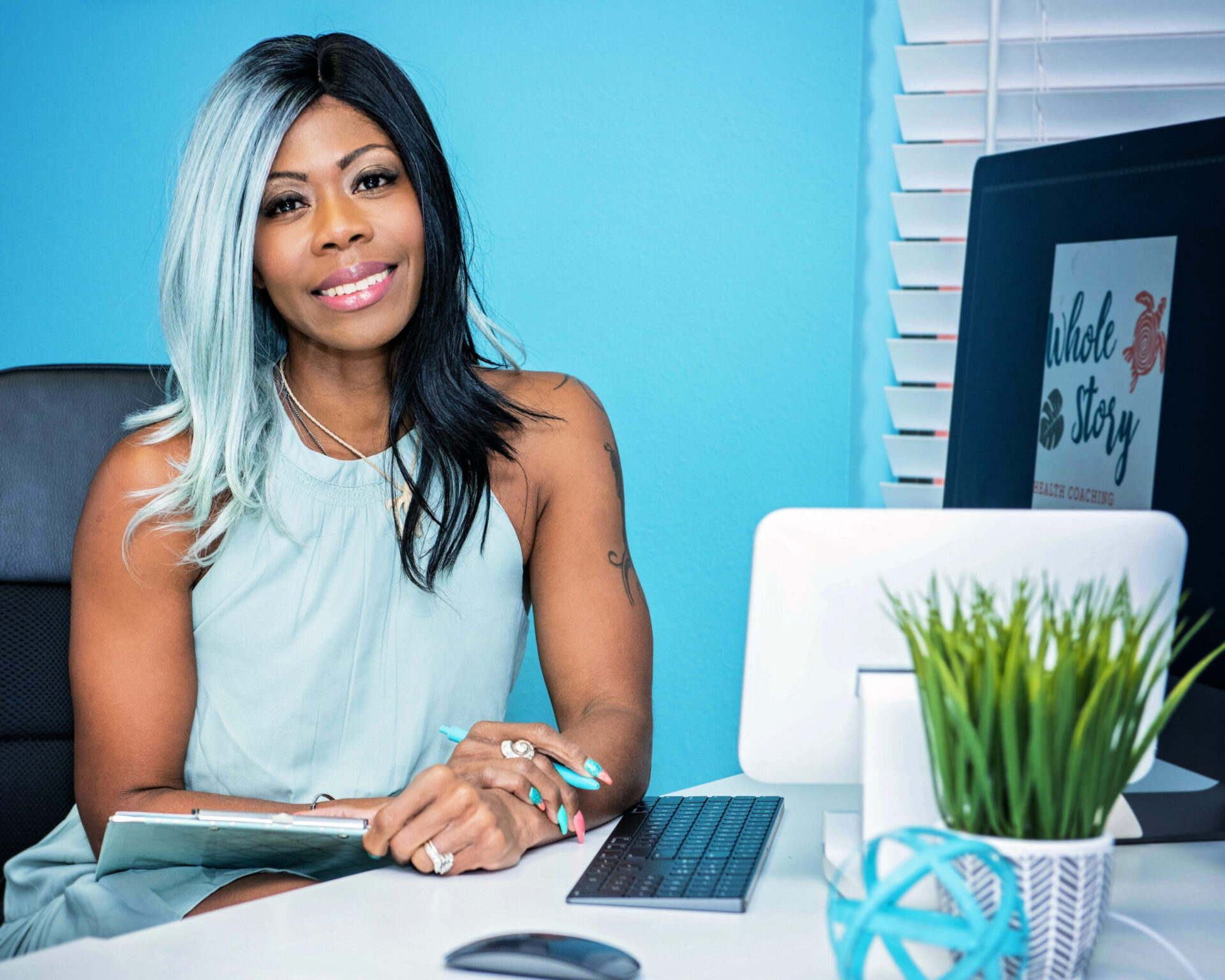Our emotions are not the enemy. This fact seems to be continually buried under all the advice to:
- “just” look on the bright side
- have a positive attitude
- put out good vibes only
Sadly, the phenomenon of toxic positivity has permeated our culture— and villainized other emotions. As the name suggests, it is a form of so-called positivity that is actually quite harmful.
While having a positive attitude and a growth mindset are absolute musts, when our positive “mentality” rises to the point of invalidating our own feelings and those of others, it becomes destructive.
Living with a goal of positivity only is unrealistic and can severely weaken us emotionally.
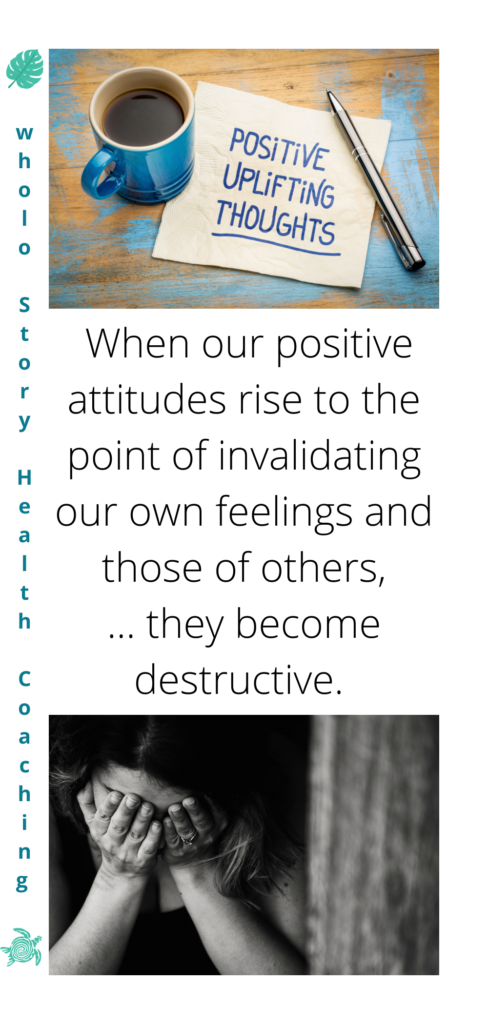
What Emotional Strength is Not
Unexpressed emotions can be confused with emotional strength; but in reality, we are suppressing what we should be feeling.
There are several, often personal reasons for this. Maybe we want to give the appearance that we:
- have everything under control
- cannot be fazed
- possess superhuman capabilities
- can be pillars of strength
To outsiders, we may seem to have it all together, but the damage that can result from unresolved emotional conflict will eventually wreak havoc on our lives and relationships.
Below are just a few of the areas that we tend to lean toward rather than doing the work that building emotional strength requires.
Avoiding
Avoiding the emotions that we don’t want to feel is easy, especially with the many ways we can distract ourselves. If we are skilled enough, we can even convince ourselves that we are truly ok and that our positivity is all we need to have a happy life.
But, when we refuse to acknowledge all of our emotions and ignore the information they are giving us, we are setting ourselves up for emotional failure—not strength.
Hiding (and suppressing) emotions
Imagine having to clean up for guests, but your home is a mess. Your temporary solution is to toss everything into the guest room.
But, when the guests leave, you don’t clean it out or organize it. And, you do this every time there’s a guest.
When we hide or suppress our emotions, it’s a similar process. We aren’t dealing with the mess; we’re just tossing it out of view.
Unfortunately, we can become so good at hiding emotions from ourselves (and others) that they are tucked away beyond our reach. While we may appear to have everything under control, we must not confuse a hidden emotion with one that has been dealt with.
Pretending
For a long time, I was a master of pretending that everything was OK. But I didn’t know that I was losing myself in the process—becoming more and more disconnected from my emotions.
There were many days when I would give myself a pep talk, wipe my tears, wash my face, take a deep breath and go out to face the world — with a smile.
This was the case after I delivered our 21-week old daughter. I was broken after her death and the loss of what was supposed to be our new family.
But rather than wallow (which I now know was grieving), I started a new job and went on with life… as if a smile were the answer to all of my problems.
Despite my efforts, pretending has never changed the reality of my circumstances—instead, it has delayed the inevitable, caused more pain, and interrupted my healing process.
Unintended Consequences of False Emotional Strength
At one point, I no longer had to pretend because I had lost most of my ability to feel deeply enough to be bothered by much of anything.
Our false appearance of emotional strength may impress other people, but it has some very real and detrimental consequences.
If we hope to have a mentally and emotionally healthy life, we must learn to process and regulate our feelings. Admittedly, this isn’t an easy thing to do.
Perhaps we are uncomfortable with negative emotions because we struggle to regulate them. But, here’s the thing, learning to gain a healthy control of our emotions comes with practice and exposure. It comes when we address them.
When we have not dealt with emotional scars in a healthy way, there will be ripple effects. Listed below are just a few areas of impact.
Impaired Perception
Circumstances and people that have hurt us can leave a filter behind that colors how we view everything and everyone we come in contact with. We may even begin to view situations or people as threats when they are not.
To increase our ability to effectively process our emotions, it is essential that we learn how to recognize these patterns of misperception and what triggers them.
Stress and Anxiety
Every time we relive the pain of an emotional injury, our fight-or-flight system activates —and we release neurochemicals/hormones in response. This is great when the threat is real and present. But, in the case of remnant emotions, the threat has already passed. Unfortunately, these stress hormones can:
- raise blood sugar
- spike blood pressure
- increase heart rate
- lower immunity
For most of us, there are many things in our past that can trigger these reactions. It is common for some of these undealt with emotions to form the basis of our anxieties. We become (unknowingly) fearful, and start to form habits and behaviors that are centered around controlling those fears.
Toxicity to Ourselves and Others
One place that unresolved emotions can manifest is in relationships. Whether based on a past bad relationship or our upbringing, our anxieties can cause us to act in ways that are manipulative, controlling, and ultimately toxic.
Sadly, we tend not to recognize what’s happening, which can lead to some very vicious cycles.
Loss of Control
Though we may not be able to acknowledge what we’re feeling, we can still be influenced by it. Unhealed hurts and buried feelings become controlling wounds—the subconscious (and painful) motivators that set themselves up to protect us, but actually end up causing more injury.
When we are operating from a foundation of emotional instability, logic has no place. We begin to make decisions that aren’t in our best interest—like choices that are designed to soothe in the moment… instead of heal in the longterm.
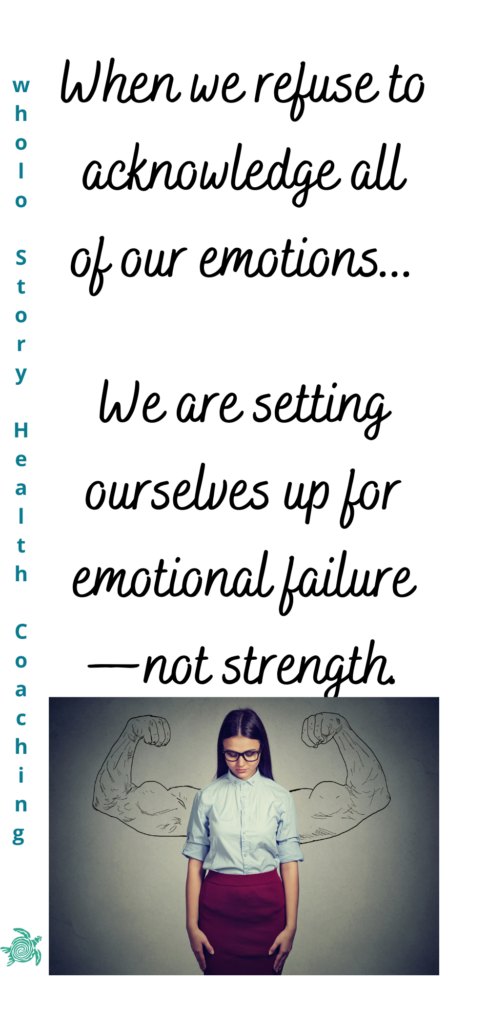
What Emotional Strength Really Involves
To assist in our emotional growth, it is helpful to have others on the journey with us. Being able to talk things out, challenge our comfort zones, and move forward are easier when we have support.
Below are just a few of the sources that we can turn to…
- the right therapist
- trustworthy and emotionally healthy friends or family
- a wise spiritual mentor
- growth oriented recovery and support groups
In some cases, we might need all of the above. The key is to have the ability to be vulnerable and open with those we choose to keep in our circle.
When we have that security, the following factors in developing emotional strength are a lot easier to tackle.
Recognizing that it’s OK to feel all emotions
Anger, sadness , frustration, and disappointment are common to all of us. Sadly, we are living in a culture that embraces positivity to the point of it becoming toxic to us. We are unintentionally taught to invalidate our emotions and deny what we feel, while our emotional health suffers.
Becoming familiar with our thoughts and sensations
There will be times when we simply cannot put our finger on a specific emotion. This is especially true when we have grown up in traumatic or dysfunctional environments.
But, when we learn how to pay attention, we can pick up on the subtle clues that our body’s provide.
For example, sometimes, I have an uneasiness that I can’t quite describe. I have noticed that it happens when I feel like I have no control.
Though this took time, mindfulness, and a chat with a therapist to decipher, once I did, I understood what to look for and how to access it.
I don’t always have a name for every emotion or feeling, but I can identify the sensations and patterns.
Honoring the emotion that we are feeling
When we give ourselves space to feel, we also give ourselves the opportunity to process what we are feeling .
We develop an awareness of how we think, how our body physically responds, and how well we react to our emotions.
With this knowledge, we gain an understanding of the areas that we need to work on. We also get valuable insight into the physical sensations that signal emotional unrest.
Being willing to be uncomfortable
Most people struggle with this, since the instant relief seems like a better option than dealing with the pain.
But, the inability to be uncomfortable leads to all sorts of unproductive and potentially destructive methods of coping.
Once we are willing to be uncomfortable, we give ourselves the opportunity to expose our wounds and hurts—making them available for healing.
Healing the wounds
This important step cannot happen without the other ones and will not happen in isolation.
Whether through the use of a coach, therapist, good friend, clergy member or support group, we will need help.
Ideally, we want to be able to work through our difficult emotions with someone that has wisdom, knowledge, and the emotional maturity and ability to hold space for us — without trying to fix us or what we’re going through.
Learning to regulate
We cannot learn to regulate what we refuse to allow ourselves to experience.
Emotional regulation involves different things for different people. For some of us, therapy is a necessity. Others might start with journaling and observation.
Deep breathing, meditations, and body scans have also been shown to be beneficial . For me, it was all of the above.
Whatever methods you choose, understand that this investment in and commitment to yourself will reap rewards for you in ways that go beyond your expectations.
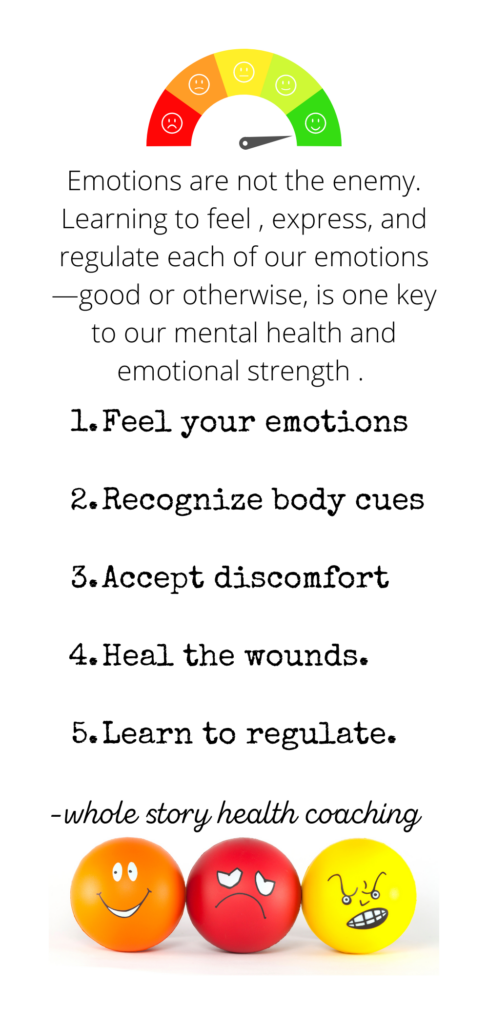
The building of emotional strength is an intentional process. It requires us to show for ourselves, confront (sometimes) overwhelming feelings, and to stay the course when things get rough.

